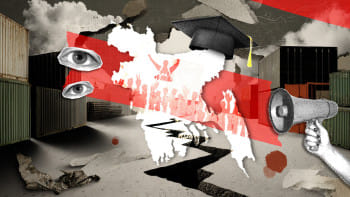Bangladesh's decision on LDC graduation deferral needs careful assessment

Bangladesh is scheduled to graduate from the United Nations' Least Developed Country (LDC) category on November 24, 2026, having met the three graduation criteria—Gross National Income (GNI) per capita, Human Assets Index (HAI), and Economic and Environmental Vulnerability Index (EVI)—for two consecutive triennial reviews since 2018. A major milestone for Bangladesh, it reflects the economy's strength, achieved through decades of progress in economic growth, poverty reduction, human development, and resilience. Yet, graduation also entails significant costs, leading to the loss of crucial international support measures (ISMs) such as duty-free quota-free (DFQF) access to developed markets, special treatment under World Trade Organization (WTO) rules, and concessional financing.
While the previous government highlighted LDC graduation as a political symbol of success, the data integrity was questionable. Short-term image building rather than long-term readiness drove the eagerness to graduate. Businesses, though outwardly supportive, have been apprehensive about whether Bangladesh is structurally ready to withstand the post-graduation challenges.
Recently, the private sector has been urging the government to seek a deferment of graduation for at least three years, citing both economic vulnerabilities and the precedent of other countries that successfully postponed their transition. Notably, the European Union (EU) has already committed to extending duty-free market access for goods originating from graduating LDCs for an additional three years after their respective graduation.
The greatest risk associated with LDC graduation is the loss of trade preferences. Bangladesh's exports are highly dependent on preferential market access. The RMG sector, which accounts for 85 percent of exports, relies heavily on DFQF access to several developed country markets, including the EU, Canada, Australia, and Japan. Our RMG products also enjoy duty-free access in some developing countries on a limited scale. In fact, Bangladesh was among the few LDCs that reaped the most benefits from preferential market access offered by developed countries. This implies that Bangladesh has the most to lose. Estimates show that preferential access covers 70 percent of our global exports. Therefore, Bangladesh's competitiveness in the global market will significantly erode after graduation.
LDC status also guarantees access to concessional development finance from multilateral institutions. Graduation will increase borrowing costs significantly. This is especially concerning for Bangladesh, given its already rising external debt service burden and low foreign exchange reserves. As one of the world's most climate-vulnerable countries, Bangladesh needs to integrate climate resilience into its economic planning, which requires adequate and continued LDC-specific climate funds to rely on. The loss of such support will increase our climate vulnerability.
Besides, Bangladesh, as an LDC, currently enjoys exemptions from several WTO obligations, including the rules on Trade-Related Intellectual Property Rights (TRIPS) and subsidy disciplines. Post-graduation, Bangladesh will lose these flexibilities, constraining industrial policy space when export diversification remains limited.
If Bangladesh seeks to defer its graduation, a strong case of its vulnerabilities derailing a smooth transition must be made. Although the country's inflation is slowly declining now, it has been above nine percent for about three years. Similarly, the foreign exchange reserve, despite its gradual increase and present stability, is much lower compared to the period when the country's reserve was equivalent to almost five to six months' import value. As of August 14, 2025, the foreign exchange reserve was $25.82 billion, which, as per the International Monetary Fund (IMF)'s benchmark, can cover about three months of imports. The government also needs to service its high external debt, borrowed by the previous government for several large infrastructure projects. The banking sector was also left in distress by the previous government. As of March 2025, the share of non-performing loans (NPLs) in the banking system had increased to 24.13 percent of total loans disbursed. Once Bangladesh Bank completes full assessment of the asset quality of all weak banks, NPL may increase further. This indicates the banking sector's constraints in providing loans to genuine businesses at a competitive interest rate. Governance failures in both state-owned and private banks have undermined financial stability, critical for supporting investment in a post-graduation scenario.
Besides, Bangladesh has not diversified its exports significantly beyond garments. Despite having huge export potential, sectors such as pharmaceuticals, leather, and ICT remain underdeveloped. Graduation without diversification could expose the economy to concentrated risks.
In addition to all the above, Bangladesh is passing through a political transition under an interim government. In the past, reforms in governance, regulatory frameworks, and transparency remained an unfinished agenda during every regime. While the current interim government has initiated a few reform measures over the last one year, the major reforms are yet to be implemented. Therefore, after the national elections, announced to be held in February 2026, reform measures must continue in the medium and long terms to achieve national economic objectives and comply with global requirements.
Several countries have been successful in deferring graduation, noting various vulnerabilities. Nepal deferred graduation after the devastating 2015 earthquake and subsequent macroeconomic challenges. Vanuatu's graduation was deferred in 2012 due to natural disasters and external shocks. Similarly, Tuvalu's graduation was postponed in 2012 for environmental vulnerabilities. Maldives' smooth transition period was extended in 2005 due to the Indian Ocean tsunami and the country graduated in 2011. The graduation of the Solomon Islands, scheduled to happen in 2024, was extended in 2023 by three years to December 13, 2027, due to various shocks disrupting its graduation process. Angola's graduation has been deferred due to the deterioration of its economy to an unspecified date. Bangladesh and Nepal were supposed to graduate in 2024, but the UN General Assembly (UNGA) extended the timeline due to the impact of the Covid-19 pandemic.
LDC status also guarantees access to concessional development finance from multilateral institutions. Graduation will increase borrowing costs significantly. This is especially concerning for Bangladesh, given its already rising external debt service burden and low foreign exchange reserves.
Therefore, deferment is not unprecedented, and the UN Committee for Development Policy (CDP) recognises exceptional circumstances, such as climate shocks, financial crises, or political instability as legitimate grounds that can cause serious setbacks to a country's development progress. Bangladesh can make a compelling case by citing the combined effect of global economic downturns, domestic macroeconomic fragility, and climate vulnerability. The recent tariff regime may impact many economies, including Bangladesh's, negatively. To overcome these challenges, the government needs to improve institutions and governance to ensure conducive fiscal, monetary and trade policies, and the private sector should work towards upgrading compliance, technology, and productivity.
If the government decides to request LDC graduation deferment and if the UNGA grants the extension, we must not forget the hard work that lies ahead. Moreover, the preparation for a smooth transition cannot be delayed. The deferral should be considered an opportunity to upgrade infrastructure; improve human capability; reform economic sectors, including trade, investment, banking, fiscal system; reduce bureaucratic red tape; and ensure transparency and accountability. Therefore, Bangladesh's requests for a deferral of the LDC graduation period should be framed as a move towards strategic readiness. Without credible reforms, deferment would merely postpone the crisis.
Dr Fahmida Khatun is executive director at the Centre for Policy Dialogue.
Views expressed in this article are the author's own.
Follow The Daily Star Opinion on Facebook for the latest opinions, commentaries and analyses by experts and professionals. To contribute your article or letter to The Daily Star Opinion, see our guidelines for submission.

 For all latest news, follow The Daily Star's Google News channel.
For all latest news, follow The Daily Star's Google News channel. 









Comments